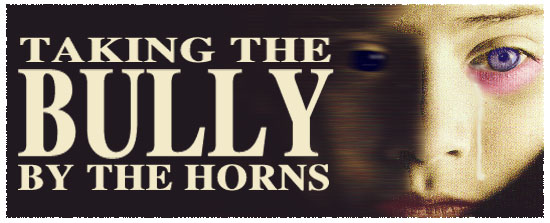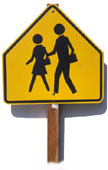
A few years back, Viewzone ran a story, Hate Crimes about a thirteen year old girl who had been subjected to racial hatred in her Florida High School. The harassment that this young girl was subjected to culminated in an attempt by a boy in her school to choke her with a piece of rope, all the time degrading her with racial remarks and stating that he was going to kill her.
We received a number of responses— almost all supportive of the girl and her mother and requesting that they be kept informed on her legal action against this type of hate crime in the school system. We are happy to report that no further incidents have occurred and that the mother has taken the matter to court. The case should be heard shortly and it is hoped that all of the children involved will receive counseling.
We heard from a number of children who shared similar stories. Some children had disabilities, deformities or were racial minorities at their schools and had been on the receiving end of similar acts of hate. Surprisingly, we also heard from children who were not "different" from their classmates, yet were being subjected to the same kind of intimidation and hatred. It became obvious that there are many "bullies" in the school system that express anger and hostility towards innocent classmates and we were asked what recourses these types of victims could pursue.
Author Kathy Noll, M.Ed., has researched the "bully" phenomenon and offered to share some insight and advice for children (and their parents) on coping with this growing problem. She suggests that we first consider why a child has become a bully and offers some useful strategies in dealing with this often traumatic, yet fairly common behavior.
T A K I N G T H E B U L L Y B Y T H E H O R N S By Kathy Noll, M.Ed. Bullying has become a very serious "Hot" topic today. It's been in the news, and the theme of several talk shows in the past year. The problem has been around for as long as people have been around, but it's only been recently that we've become aware enough to do something about it. Mental and physical signs for parents to look for to find out if their child is being bullied include: Cuts, bruises, torn clothing, headaches and/or stomach pains before it's time to go to school, or a reluctance to go to school, poor appetites, poor grades, decline/withdrawal from usual activities, anxiety, not many friends, always loses money, depression, fear, anger, and relates better to adults and teachers than children. It also helps to understand the different types of abuse the bully can inflict. This can vary from physical (juvenile violence) to verbal, and include mental control tactics. (Crushing your self-esteem). The bully's pattern of physical abuse might include: pushing, tripping, slapping, hitting, wrestling, choking, kicking, biting, stealing, and breaking things. (80% of the time bullying becomes physical). The bully's pattern of verbal abuse might include: twisting your words around, judging you unfairly, missing the point, passing blame, bossing, making you self-conscious, embarrassing you, making you cry, confusing you, and making you feel small so he/she can feel big. Children between the ages of 5-11 begin using verbal abuse, and are capable of some physical abuse such as fist fighting, kicking, and choking. However, once a child reaches the age of 12, psychological changes take place and the bullying becomes more violent. This might include the use of weapons and sexual abuse. Murder between children was up 35% in 1997. Today's 3, 4, and 5 year-olds could grow up to be a generation of serial killers. Some signs to watch for in younger children include setting fires, and torturing animals. Usually bullies come from middle-income families that do not monitor their activities. The parents of bullies are either extremely tolerant and permissive, and allow them to get away with everything, or physically aggressive and abusive. Bullies like to be in control of situations, and enjoy inflicting injury on others. They have less commitment to school and teachers. Usually taller and stronger than other children their own age, bullies see the world with a paranoid's eye. They see threats where none exist and believe that their anger and aggressiveness is justified. The bully might lash out at people because he's angry about something. Maybe someone in his life is bullying him. He could be hurting from abuse he received in the past, or maybe he grew up observing those around him using violence as a means of settling differences. Sometimes jealousy is the culprit. He needs to feel better about himself in order to change, and to stop bullying. Or, in a worse case scenario, he might actually be a sociopath, in which case he/she would need to get professional help. What can parents do to prevent their children from getting bullied? Tell your children to walk or play with friends, not alone, and to avoid empty buildings and alleys. Make a list with the child as to where they are allowed to go, and places where they can get help. Know your child's friends and make sure that other adults in his/her life understand your view of teasing and violence. Teach your child to be strong and kind! If your child is a victim, he needs to know that he's OK, and not the one with the problem. Have him tell his school guidance counselor the name of the bully who is victimizing him. Or you might try talking to the principal or his teachers directly. And if you know the parents of the bully, you might try confronting them as well. However, there's a good chance they'll either be in denial, or be as unconcerned as their child.
If verbal abuse is the problem, your child could try confronting the bully himself. Get him alone. Bullies like to show off by embarrassing you in front of a group of people. They might not be so tough without a crowd. Tell your child to be firm, stick up for himself, and tell the bully, "I don't like what you're doing to me, and I want you to stop." If the child is old enough to reason, have him tell the bully how it feels to be bullied. Don't stress what the bully did, or the accusations might make him defensive. Then he'd be less likely to listen. If he's willing to listen at all, he might be willing to change. However, if he's unwilling to listen and starts getting nasty, your child is better off staying away from him, or ignoring him. But if his verbal abuse turns into threats, notify someone in authority. Sometimes having his things stolen victimizes a child. Putting your child's name on everything is an important thing to do. This means each and every crayon! It also helps to not allow him/her to take things of any major importance or value to school. Again, if nothing else works, have the bully reported. For the past 10 years child on child violence has been increasing in America. Physical abuse, sexual assault, sexual harassment and robbery have driven many victims to substance abuse or suicide. HOW A BULLY BECOMES A BULLY:
WHAT TO DO ABOUT BULLIES:
|
|
About the author, Kathy Noll. When Dr. Jay Carter wrote his self-help book about invalidation between adults entitled, "Nasty People," he received a ton of mail from readers whose lives he helped, and changed. A lot of those people were parents who requested he write another version of his book that their children would understand and could benefit. After 8 years of searching for the right person to write a children's version of his best-selling book, he found me. Jay feels I have an original style of writing, and the ability to talk with young people on their level. He felt I was perfect for the project, and I didn't want to let him down. I worked on it day and night, interviewing older and younger people on both bullying and self-esteem issues. The rest is history! I'm proud to announce the result of my efforts, Taking the Bully by the Horns. This book was written because there is a need for it. Bullying has become a very serious, hot-topic today. We're seeing more and more trouble with bullies in the news. Some have driven other children to suicide. Bullying has been around for as long as people have been around, but it's only been recently that we've become aware enough to do something about it. For more information, or to contact the author, please see her web site at http://kathynoll.com. We would also like to share any other stories or advice that you may have, as parents or children, on coping with hatred and violence in our schools. Please address your comments to Editor of Viewzone.
|
 If physical abuse is the problem, and you're afraid of angering the bully, tell the teacher, or whomever, not to pass on your or your child's name while settling the situation.
If physical abuse is the problem, and you're afraid of angering the bully, tell the teacher, or whomever, not to pass on your or your child's name while settling the situation.